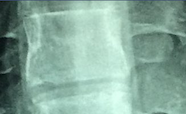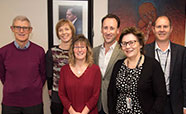University of Otago researchers are investigating risk factors affecting mental health including childhood adversity, addiction, alcohol and drugs.
Christchurch Health and Development Study
 The Christchurch Health and Development Study (CHDS) has been in existence for over 40 years. During this time we have followed the health, education and life progress of a group of 1,265 children born in the Christchurch (New Zealand) urban region during mid-1977.
The Christchurch Health and Development Study (CHDS) has been in existence for over 40 years. During this time we have followed the health, education and life progress of a group of 1,265 children born in the Christchurch (New Zealand) urban region during mid-1977.
Current research objectives:
- Alcohol and cannabis use in the CHDS cohort
- Psychosocial and functional impairment resulting from mental disorders over the life course
- The long-term psychosocial impact of exposure to maltreatment in childhood
- The interplay between genes, environment and mental disorders
- The psychosocial consequences of a major disaster (the Canterbury Earthquakes) in the CHDS cohort
- Te Ao Māori perspective: the use of He Awa Whiria (a Braided Rivers model) to examine the CHDS data from both Western Science and kaupapa Māori perspectives
- The development of translational applications of research findings from the CHDS to contribute to policy development, implementation and evaluation
- The links between personality traits and adult psychosocial functioning
- The transitions to menopause for women aged 40
- Psychosocial factors associated with obesity
Risk factors
Professor John Horwood has research interests in psychosocial adjustment in young adolescence including consequences of drug use, the Canterbury earthquakes, and preterm birth.
Associate Professor Joseph Boden investigates the psychosocial causes and consequences of substance use, abuse, and dependence, mental health and substance use epidemiology, and the social and psychological determinants of maladaptive behaviour including aggression and violence.
Email chds.uoc@otago.ac.nz
Web otago.ac.nz/christchurch/research/healthdevelopment/research/
Department of Pharmacology and Toxicology
Cannabinoids toxicity
 Professor Michelle Glass' research focuses on the expression, function and molecular pharmacology of the cannabinoid receptors. Her recent research interests have extended to identifying the mechanism by which synthetic cannabinoids are resulting in high levels of toxicity in the community and advising on the development of clinical trials for medicinal cannabis products.
Professor Michelle Glass' research focuses on the expression, function and molecular pharmacology of the cannabinoid receptors. Her recent research interests have extended to identifying the mechanism by which synthetic cannabinoids are resulting in high levels of toxicity in the community and advising on the development of clinical trials for medicinal cannabis products.
Synthetic cannabis under spotlight for new Pharmacology head (Otago Bulletin)
Email pharmacology@otago.ac.nz
Web otago.ac.nz/phal/research/
Department of Psychological Medicine, University of Otago, Christchurch (UOC)
 The Department of Psychological Medicine in Christchurch has two major streams of research:
The Department of Psychological Medicine in Christchurch has two major streams of research:
- Clinical Research
- Health and Development Study
Addiction and co-existing disorders
Professor Doug Sellman, Associate Professor Simon Adamson, Dr James Foulds
Anxiety disorders and treatment
Professor Caroline Bell, Associate Professor Ben Beaglehole, Dr Jenny Jordan
Eating disorders
Professor Lois Surgenor, Dr Jenny Jordan
Psychological consequences of disasters and trauma
Professor Caroline Bell, Associate Professor Ben Beaglehole, Professor Richard Porter
Project: First-episode psychosis in Māori
Project grant funded by Rangahau Hauora Māori ( HRC ).
Investigators: Suzanne Pitama, Ruth Cunningham, James Stanley, Sue Crengle, Richard Porter, Marie Crowe
Health and Development Study
The Christchurch Health and Development Study ( CHDS ) has followed the health, education and life progress of a group of 1,265 children born in the Christchurch (New Zealand) urban region during mid 1977.
Contact Professor John Horwood or Associate Professor Joseph Boden for further information and study opportunities.
Email psychmed.uoc@otago.ac.nz
Web otago.ac.nz/christchurch/departments/psychmed/research/
Department of Psychological Medicine, Dunedin School of Medicine (DSM)
Our collaborative research philosophy draws on the clinical and academic skills of the Department's psychiatrists and clinical and health psychologists with the overarching aim to improve mental health and the treatment of mental disorders, and to better understand how psychological factors influence physical health.
Our research projects are wide-ranging and fall within six main themes:
- Clinical psychiatry
- Health and medical psychology
- Mental disorders
- Psychopharmacology
- Sexual health and sexual harm
- Suicide prevention
Mental health epidemiology
Professor Kate Scott is a psychiatric epidemiologist and senior investigator in the World Health Organization's World Mental Health (WMH) Surveys Initiative, a coordinated series of household epidemiologic surveys of mental disorders in over 30 countries around the world. Her interests are in cross-national psychiatric epidemiology, the inter-relationship between mental and physical disorders, and gender differences in mental disorders.
Risk factors
Dr Sarah Fortune is an academic clinical psychologist with an enduring clinical and research interest in suicide prevention, and adolescent self-harm.
Dr Charlene Rapsey is a clinical psychologist who among her interests investigates childhood adversity as a risk factor for mental health.
Associate Professor Tess Patterson's research interests are in applied clinical and forensic psychology domains including childhood sexual abuse, harmful sexual behaviour and sexual offending, and alcohol and drug treatment outcomes.
Health and medical psychology
Associate Professor Nicola Swain investigates Health Psychology which focuses on how psychological and behavioural factors influence physical health, with the range of topics including chronic pain management, aggression and violence in healthcare, applications of mindfulness, and issues for carers.
Email psychological-medicine@otago.ac.nz
Web otago.ac.nz/dsm-psychmed/research/
Department of Psychological Medicine, University of Otago, Wellington (UOW)
 Our research programmes are configured around several themes relevant to mental health practice in the New Zealand setting:
Our research programmes are configured around several themes relevant to mental health practice in the New Zealand setting:
- Physical health of people with mental illness, including obesity and sleep
- Mental health service delivery and evaluation, including in primary care and secondary care
- The interface between psychological and physical health
- Social psychiatry and psychiatric epidemiology
- Suicide
- Service user-led and co-produced research and teaching (World of Difference project)
- Personality and its role in mental illness
- Education in the clinical professions
- Addictions
- Mental health law
- Stigma and discrimination
Addiction
Associate Professor Giles Newton-Howes is a general adult consultant psychiatrist with a sub-specialty in substance-misuse psychiatry. His research interests include the clinical understanding of personality disorders, particularly as they relate to psychiatric patients and mental-state disorder. He is also interested in the interface between psychiatry and society, particularly the application of coercive practices.
Email kristy.wilson@otago.ac.nz
Web otago.ac.nz/wellington/departments/psychologicalmedicine/research/
Gene Structure and Function Laboratory
 Professor Martin Kennedy is director of the Gene Structure and Function Laboratory. They are interested in the application of genetics to the understanding and treatment of disease. Their main research themes are pharmacogenomics, psychiatric genetics, and the genetics of complex disease.
Professor Martin Kennedy is director of the Gene Structure and Function Laboratory. They are interested in the application of genetics to the understanding and treatment of disease. Their main research themes are pharmacogenomics, psychiatric genetics, and the genetics of complex disease.
The Gene by environment interactions in health and development programme explores gene by environment interactions, epigenetic and epigenomic studies, and analysis of genetic factors underlying personality and mental health, in the context of international research consortia including the Psychiatric Genomics Consortium.
The Anorexia Nervosa Genetics New Zealand study seeks to understand genetic factors that predispose to the eating disorder Anorexia nervosa.
Email martin.kennedy@otago.ac.nz
Web otago.ac.nz/gene-structure/research
Injury Prevention Research Unit
 Injury Prevention Research Unit (IPRU) undertakes research that contributes to reducing the incidence, severity and adverse consequences of injury in New Zealand. IPRU's staff work in a wide range of research areas: unintentional injury, outcomes of injury, and injury prevention.
Injury Prevention Research Unit (IPRU) undertakes research that contributes to reducing the incidence, severity and adverse consequences of injury in New Zealand. IPRU's staff work in a wide range of research areas: unintentional injury, outcomes of injury, and injury prevention.
Alcohol misuse
Professor Jennie Connor is a public health physician and epidemiologist, who teaches epidemiology. She has 20 years of experience in public health research that has largely focused on injury prevention, sexual and reproductive health, and the health impacts of alcohol. Current research collaborations include evaluation of New Zealand's alcohol legislation and quantifying alcohol's harm to others.
Professor Kyp Kypri's area of interest is alcohol-related injury. He is an investigator on the HRC-funded Evaluation of New Zealand's Alcohol Laws (ENZALs) led by Dr Brett Maclennan, and is leading a study of suppression clauses used in government research contracts. He contributes to a number of projects conducted by the Alcohol Research Group Otago, led by Professor Jennie Connor.
Email iprunz@otago.ac.nz
Web https://blogs.otago.ac.nz/ipru/research
National Addiction Centre
 The National Addiction Centre (NAC) is active in teaching, research, and sector leadership activities.
The National Addiction Centre (NAC) is active in teaching, research, and sector leadership activities.
NAC research activities have included projects covering a wide range of substance addictions as well as compulsive overeating and problem gambling, and the presence of co-existing mental health problems. Research projects often involve students completing Master's or Doctoral degrees.
NAC academic staff play an active role in the wider addiction and mental health sectors contributing to a range of organizations and initiatives.
Email lisa.andrews@otago.ac.nz
Web otago.ac.nz/christchurch/research/nac/research/
Ngāi Tahu Māori Health Research Unit – Te Roopū Rakahau Hauora Māori o Kāi Tahu
 The Ngāi Tahu Māori Health Research Unit (NTMHRU) contributes to a wide range of Māori health research projects and initiatives within the Department of Preventive and Social Medicine, the University of Otago, and our communities to ensure important and beneficial outcomes for Māori.
The Ngāi Tahu Māori Health Research Unit (NTMHRU) contributes to a wide range of Māori health research projects and initiatives within the Department of Preventive and Social Medicine, the University of Otago, and our communities to ensure important and beneficial outcomes for Māori.
Our people – Ko tātou
Research in mental health:
The Psychological and Physical Health and Wellbeing of New Zealand Contemporary Veterans
Professor Emma Wyeth is a Named Investigator on this project led by Professor David McBride. The project aims to describe the risk and protective factors for health and well-being of New Zealand veterans, including specifically for Māori veterans, who have served during and since the Persian Gulf War. This study will help to determine the prevalence of post-traumatic stress disorder (PTSD) and Multiple Symptom Illness (MSI) for this group.
Email ntmhru@otago.ac.nz
Web otago.ac.nz/maori-health-research/research/index.html